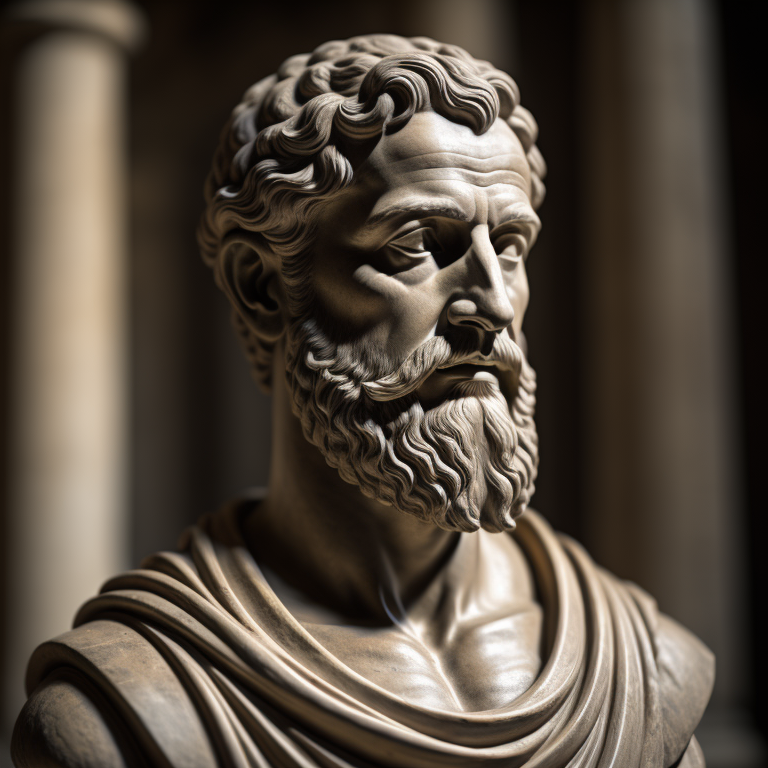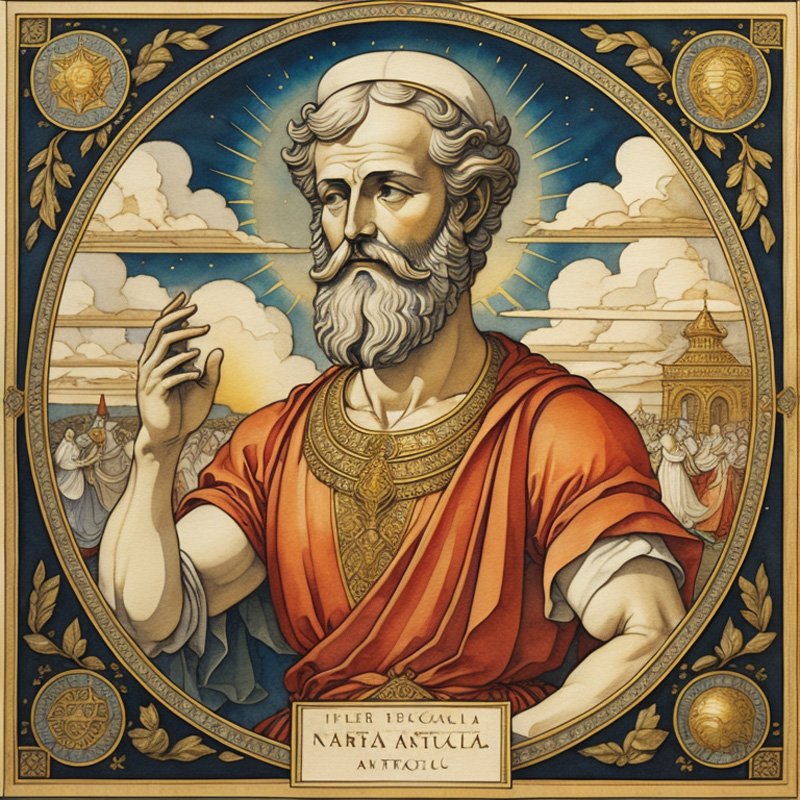
Aristotle
Aristotle: Exploring his Philosophy
Aristotle (384-322 BC)
Aristotle was a Greek philosopher, polymath and scientist born in the city of Stagira, north of Ancient Greece. He is considered along with Plato, the father of Western philosophy. His ideas have exerted an enormous influence on the intellectual history of the West for more than two millennia.
Main philosophical ideas of Aristotle
Aristotle was interested in a wide range of topics, including logic, metaphysics, physics, biology, ethics, politics, rhetoric, and poetics. His most important ideas include:
-
The theory of substance:
Aristotle held that all things are composed of matter and form. Matter is the “stuff” that a thing is made of, and form is what makes that thing what it is.
-
The theory of syllogism:
Aristotle developed a system of deductive reasoning called a syllogism. A syllogism is an argument that consists of three propositions: a major premise, a minor premise, and a conclusion.
-
The theory of causes:
Aristotle classified causes into four types: the material cause, the formal cause, the efficient cause and the final cause. The material cause is the matter of which a thing is made; the formal cause is the form of the thing; The efficient cause is what makes the thing move or change; and the final cause is the purpose or objective of the thing.
-
Eudaimonistic ethics:
Aristotle held that happiness (eudaimonia) is the ultimate goal of human life. Happiness is achieved through the practice of virtue, which is an excellence of character that allows people to act rationally and morally.
-
Politics:
Aristotle believed that the best type of government is the polis, a city-state ruled by a middle-class aristocracy.
Aristotle’s philosophy in one sentence
Aristotle’s philosophy can be summed up in the phrase “the whole is greater than the sum of its parts.” This means that things are not simply the sum of their parts, but rather have a holistic nature that cannot be explained by their individual parts.
Explanation of Aristotle’s philosophy for a 10-year-old child
Imagine you have a Lego toy. You can build a lot of different things with that toy, but the toy itself is nothing. It’s only when you start building with it that it comes to life. The same goes for the world. The world is made of many different things, but it is nothing until we start studying it and learning about it.
Explanation of Aristotle’s philosophy for an adult
Aristotle’s philosophy is very rich and complex, but at its core it is about understanding the nature of the world and our place in it. Aristotle believed that the world is orderly and that there is a purpose for everything that happens. He also believed that reason is the most important tool we have to understand the world.
The positive side of Aristotle’s philosophy
Aristotle’s philosophy has many positive aspects. One of the most important is his emphasis on reason. Aristotle believed that reason is the most important tool we have to understand the world and our place in it. This means that it encourages us to think critically about the world and not accept things blindly. Another positive aspect of Aristotle’s philosophy is his emphasis on virtue. Aristotle believed that happiness (eudaimonia) is the ultimate goal of human life, and that virtue is the path to achieving it. This means that it encourages us to live a moral and ethical life, and to be good and just people. Finally, Aristotle’s philosophy is very rich and complex, which means that there is a lot to learn from it. This makes it a source of knowledge and wisdom that can be very useful to us in our daily lives.
The negative side of Aristotle’s philosophy
Aristotle’s philosophy also has some negative aspects. One of the most important is his elitism. Aristotle believed that reason is a capacity that only a few have, and that the rest are destined to be ruled by the most intelligent. This can be seen as a way of justifying social inequality. Another negative aspect of Aristotle’s philosophy is its lack of empirical evidence. Aristotle based his philosophy on observation and reason, but not on scientific experimentation. This means that his ideas are not always reliable, and can be refuted by science.
A real-life problem to apply this philosophy:
A real-life problem that fits well with Aristotle’s philosophy is the problem of decision making. We often find ourselves in situations where we have to make difficult decisions, and we don’t know what to do. Aristotle’s philosophy can help us make better decisions by teaching us to think critically about the options we have and choose the one that is most virtuous. For example, let’s imagine that we have to decide between two jobs. One job is more prestigious and pays more, but the other is more satisfying and allows us to work with people we like. Aristotle’s philosophy can help us make an informed decision by considering the different options and choosing the one that makes us happiest.

The philosophy opposite to that of Aristotle: skepticism.
The skepticism
Skepticism is a school of thought that maintains that nothing can be known with certainty. Skeptics argue that our senses can deceive us, and that reason is unreliable. Therefore, we cannot be sure of anything.
Why is it opposed to Aristotle’s philosophy?
Aristotle’s philosophy is based on reason and observation. Aristotle believed that reason is the most important tool we have for understanding the world, and that observation allows us to gather data about the world. Therefore, Aristotle believed that we can know the world with some degree of certainty.
Positive aspects of skepticism
Skepticism has some positive aspects. One of the most important is that it can help us be more tolerant of the ideas of others. When we recognize that we cannot know anything for certain, we also recognize that the opinions of others are just as valid as our own.
Another positive aspect of skepticism is that it can help us be more humble. When we recognize that we cannot know everything, we also recognize that we are not omniscient. This can help us be more understanding of others and avoid falling into arrogance.
Negative aspects of skepticism
Skepticism also has some negative aspects. One of the most important is that it can lead to nihilism. Nihilism is the belief that life has no meaning. If we can’t know anything for sure, and if life has no meaning, then why bother living?
Another negative aspect of skepticism is that it can lead to cynicism. Cynicism is the belief that people are inherently bad or corrupt. If we can’t trust our senses or our reason, then how can we trust people?

Sources
Books:
- “Ética a Nicómaco” de Aristóteles
- “Las Metafísicas” de Aristóteles
- “La Política” de Aristóteles
Websites:
- Wikipedia, la enciclopedia libre: https://es.wikipedia.org/wiki/Arist%C3%B3teles
- Stanford Encyclopedia of Philosophy: https://plato.stanford.edu/entries/aristotle/
- Internet Encyclopedia of Philosophy: https://iep.utm.edu/aristotle/





0 comments